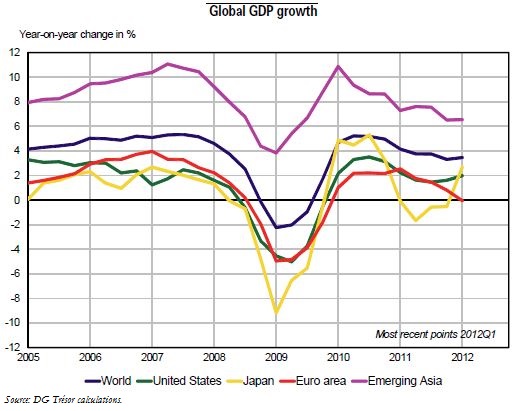Trésor-Economics No. 104 - The world economy in the summer of 2012: a fragile recovery
The world economic outlook in the summer of 2012 hinges on the resolution of the crisis in the euro area. Monetary policy decisions made at the end of 2011 significantly reduced financial tensions and stabilised growth in early 2012. Recent developments in Spain and in Greece, in the run-up to the elections, have revived some fears and weakened the short-term outlook for the euro area, particularly in Southern countries. German growth has remained firm, underpinned by sturdy household consumption and foreign trade driven by exports to countries outside of the euro area. Growth in the United Kingdom slowed, primarily as a result of businesses' adopting a wait-and-see attitude.
Growth was slightly stronger in other areas of the world. Rapid easing of tensions in the United States enabled the economy to make steady progress over the last few quarters, boosted by strong job growth, although this flagged in recent months. Growth in China slowed, mainly as a result of sluggish world trade, but was still relatively strong. Following Japan's natural catastrophe in March 2011, economic growth was boosted by public-sector and private-sector spending on reconstruction.
The long-winded process of reducing general government, household and corporate debt will continue to weigh on the outlook for growth in the majority of the advanced economies up until 2013. Weak labour markets in Europe and the United States will also hinder recovery. In the event that the financial situation gradually returns to normal, the euro area's economy will contract slightly in 2012 and then resume moderate growth in 2013. Disparities will continue to widen, with the Southern European countries (Spain and Italy) in recession and Germany still showing growth. The process of consolidating public finances will hinder growth in the United Kingdom. The pace of American economic growth will be slower, as determined by fiscal policy, which is bound to be very restrictive in 2013. Japan's growth profile will depend on the timetable for reconstruction, with stronger growth in 2012 than in 2013. China should continued to enjoy sustained growth.
Major uncertainty surrounds the economic situation, primarily because of developments in the euro area. Recent events in Spain and Greece have delayed the end of the crisis and underlined the vulnerability of the European economy. The decisions made at the European Council meeting of 28 and 29 June could lead to more rapid easing of tensions and promote growth.
